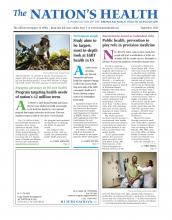A new study of lesbian, gay, bisexual, transgender and queer health has organizers hoping it will be the most in-depth long-term study of the LGBT community’s health in U.S. history, drawing comparisons to the Framingham Heart Study.
Launched on June 25 at the University of California-San Francisco, the Population Research in Identity and Disparities for Equality, or PRIDE, Study is a two-part longitudinal study that could impact the way researchers and educators understand, treat and teach about LGBT health.
The study is collecting data from thousands of LGBT people via an Apple app that allows participants to share data on demographics, health and census. No other study has ever attempted to take such a broad, yet detailed, account of the health of the LGBT community, said Juno Obedin-Maliver, MD, MPH, co-founder and co-director of the study and a research fellow in the UCSF School of Medicine and the San Francisco Veterans Affairs Medical Center.
When Obedin-Maliver and co-founder and co-director Mitchell Lunn, MD, were in medical school a decade ago, they sought schools of medicine that were providing in-depth information and training on LGBT health. Their findings were bleak: Few institutions were doing so because of a lack of evidence-based medicine and research available to build a curriculum. In a September 2011 paper published in the Journal of the American Medical Association, Obedin-Maliver and other authors, including Lunn, found that many deans of medicine were frustrated with how little information was available to students about LGBT health.
As members of the LGBT community themselves, Obedin-Maliver and Lunn decided to found a study that could be the key to understanding disparities and similarities in the health needs of the LGBT community.
In less than a month, more than 13,000 people have enrolled in the study, making it reportedly the largest LGBT health study ever done in the U.S. Because of its longitudinal approach, it has drawn comparisons to the Framingham Heart Study, which since 1948 has enrolled Framingham, Massachusetts, residents in a study that has informed much of what science knows about cardiovascular health.
The UCSF study is using Apple’s ResearchKit, an open-source project that makes it possible for researchers to build apps and reach people who might otherwise not be part of large longitudinal studies. Obedin-Maliver said ResearchKit designers at Thread Research, a development company, developed the app for free, as the PRIDE Study is just the type of project the developers hoped ResearchKit would be used for.

A longitudinal study on LGBT health from the University of California-San Francisco will use technology developed via Apple’s ResearchKit to collect mobile data from participants.
Photo by RidoFranz courtesy iStockphoto
The “active listening” stage of the study will continue for six to nine months to shape phase 2, which will look at how LGBT health needs shift over time, location, gender and sexual orientation, Obedin-Maliver told The Nation’s Health.
“Our goal is really to understand how LGBT people themselves would prioritize and pose research questions,” she said. “I might have questions about breast cancer in transgender men that might not actually be relevant to the transgender men who are in our cohort. They might ask other questions.”
Phase 2 of the study will be a longitudinal cohort, starting in 2016, involving annual questionnaires. The goal of the study’s researchers is to have everything available online for participants, Obedin-Maliver added.
Sel Hwahng, PhD, program chair of APHA’s LGBT Caucus of Public Health Professionals, noted that while the study will collect a lot of data, it runs the risk of collecting information on already widely-studied portions of the LGBT community, particularly men who have sex with men. Low-income people have less access to the Internet and smartphones, Hwahng said, therefore skewing data toward more socio-economically privileged people.
“At the end of the day, people are not going to benefit across the board unless we actually do focus on providing services to our most vulnerable members of our population,” Hwahng said.
That point is not lost on study co-founders. Obedin-Maliver said Web-based versions of materials will be available soon, as will phone, mail and in-person versions of the surveys, promoted through the study’s 42 partners.
Such options will make study results more valuable to both its founders and the greater LGBT community, said Justin Goforth, RN, director of community relations at Whitman-Walker Health in Washington, D.C., a community health center focused on HIV/AIDS care and LGBT care.
Goforth said offering the first portion of the study on Apple devices can help level the playing field. According to the Pew Research Center, as of May 2013, 63 percent of adult cellphone owners use their phones to go online. Using this technology can help reach members of the LGBT community who might be missed otherwise, including those who do not identify as LGBT.
“To folks like us who work in this, it’s a really intuitive answer,” Goforth told The Nation’s Health. “Longitudinal studies are really what get you the answers.”
To learn more about the study, visit www.pridestudy.org. To participate, text PRIDESTUDY to 74121 or search for “PRIDE Study” in the iTunes store.
- Copyright The Nation’s Health, American Public Health Association









